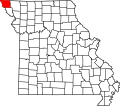2010 census
As of the census [11] of 2010, there were 1,583 people, 703 households, and 421 families living in the city. The population density was 1,138.8 inhabitants per square mile (439.7/km2). There were 844 housing units at an average density of 607.2 per square mile (234.4/km2). The racial makeup of the city was 97.9% White, 0.8% African American, 0.4% Native American, 0.4% Asian, 0.1% from other races, and 0.4% from two or more races. Hispanic or Latino of any race were 1.0% of the population.
There were 703 households, of which 25.2% had children under the age of 18 living with them, 46.9% were married couples living together, 8.0% had a female householder with no husband present, 5.0% had a male householder with no wife present, and 40.1% were non-families. 35.4% of all households were made up of individuals, and 17.1% had someone living alone who was 65 years of age or older. The average household size was 2.19 and the average family size was 2.83.
The median age in the city was 45.9 years. 20.6% of residents were under the age of 18; 6.9% were between the ages of 18 and 24; 21% were from 25 to 44; 29.1% were from 45 to 64; and 22.3% were 65 years of age or older. The gender makeup of the city was 48.3% male and 51.7% female.
2000 census
As of the census [3] of 2000, there were 1,935 people, 749 households, and 468 families living in the city. The population density was 1,397.9 inhabitants per square mile (539.7/km2). There were 843 housing units at an average density of 609.0 per square mile (235.1/km2). The racial makeup of the city was 92.45% White, 6.30% African American, 0.26% Native American, 0.26% Asian, 0.36% from other races, and 0.36% from two or more races. Hispanic or Latino of any race were 0.78% of the population.
There were 749 households, out of which 27.0% had children under the age of 18 living with them, 48.1% were married couples living together, 10.0% had a female householder with no husband present, and 37.4% were non-families. 33.6% of all households were made up of individuals, and 17.9% had someone living alone who was 65 years of age or older. The average household size was 2.26 and the average family size was 2.87.
In the city the population was spread out, with 29.1% under the age of 18, 7.5% from 18 to 24, 22.9% from 25 to 44, 20.8% from 45 to 64, and 19.6% who were 65 years of age or older. The median age was 38 years. For every 100 females, there were 106.1 males. For every 100 females age 18 and over, there were 86.4 males.
The median income for a household in the city was $28,144, and the median income for a family was $34,625. Males had a median income of $26,900 versus $18,681 for females. The per capita income for the city was $14,160. About 12.4% of families and 16.3% of the population were below the poverty line, including 20.4% of those under age 18 and 15.5% of those age 65 or over.


